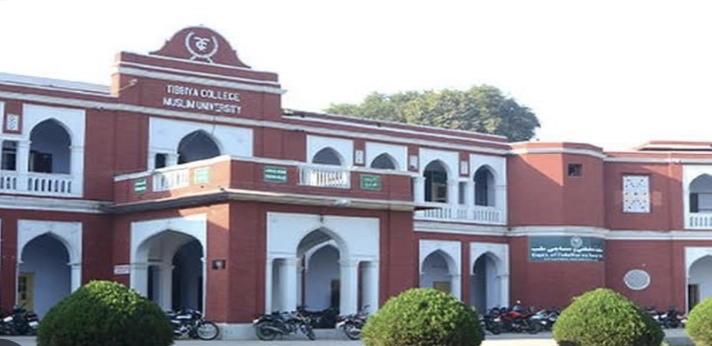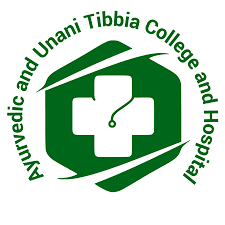
A & U Tibbia College, Karol Bagh

1. Overview
The prestigious A & U Tibbia College in New Delhi’s Karol Bagh is devoted to the study and practice of Unani medicine. It was established in 1967 and is regarded as India’s leading Unani education center. It is run by the Delhi government. The college’s objectives are to promote the application of Unani principles in healthcare, encourage research, and provide high-quality education. A & U Tibbia College’s affiliation with Guru Gobind Singh Indraprastha University also ensures that its programs meet rigorous academic requirements.
2. Programs Offered
A & U Tibbia College provides a variety of training opportunities for students interested in studying Unani medicine:
Courses for Undergraduates:
Bachelor of Unani Medicine and Surgery, or B.U.M.S. : The most prestigious undergraduate program lasts five and a half years and includes an internship of one year. The fundamental sciences, clinical practice, and fundamentals of Unani therapy are all covered in this program, which aims to provide students with a comprehensive understanding of Unani medicine. In order to prepare students for a career in Unani healthcare, the curriculum places an emphasis on both theoretical and practical instruction.
Programs for Graduates:
Doctor (Unani): A Master of Unani Studies degree is offered by A & U Tibbia College, enabling graduates to specialize in a variety of Unani medicine specialties. Advanced clinical practices, research methods, and the integration of contemporary medical practices with Unani principles are the primary focuses of this program, which typically lasts for three years. Moalajat (medicine), Ilmul Advia (pharmacology), and Ilmul Qabalat (gynecology) are just a few of the specializations available to students.
Doctoral Programs: Doctoral programs in Unani medicine are available at the college for candidates interested in conducting research. The Ph.D. program gives you the chance to contribute original research and scholarly work to the field.
3. Infrastructure and Facilities
A & U Tibbia College has modern facilities to help its students with their academic and practical training:
Classrooms: Classrooms at the college are large and well-ventilated, facilitating interactive learning. These classrooms, which are equipped with audio-visual aids, provide students with engaging and instructive lectures, which enhance the educational experience.
Laboratories: For practical training in subjects like anatomy, physiology, and unani pharmacology, the college has specialized laboratories. Students can gain practical experience and develop skills necessary for their future careers in these labs.
Library: Students can benefit greatly from the extensive collection of books, journals, and research papers on Unani medicine and complementary and alternative medicine in the college library. Digital resources for academic research are also available at the library.
Services for patients: A teaching hospital is connected to A & U Tibbia College, which provides students with clinical experience. Students can put their knowledge to use in real-world clinical settings thanks to this hospital’s numerous services and modern medical facilities.
4. Faculty
The professionals who make up the A & U Tibbia College faculty are highly qualified and experienced, and they are committed to providing high-quality education:
Staff teaching: A diverse group of professors, associate professors, and assistant professors who specialize in a variety of Unani medicine areas are employed by the college. The faculty members have a sincere interest in instructing and advising students, ensuring that each one receives individualized care throughout their academic careers.
Scholars in Research: Numerous faculty members actively participate in research and advance Unani medicine. Students are encouraged to participate in research projects as a result of their involvement in research, which contributes to the creation of an environment that is intellectually stimulating.
5. A & U Tibbia College’s research and development department is crucial to the advancement of Unani medicine and its integration into modern healthcare:
Efforts in Research: The college encourages faculty and students to participate in research projects to investigate various aspects of Unani medicine. The effectiveness of Unani treatments, pharmacological studies of herbal remedies, and the development of novel therapeutic strategies are all potential research topics.
Collaborations: In order to improve its research capabilities, A & U Tibbia College works with various research organizations and universities. These partnerships aid in the scientific validation of Unani practices and facilitate the exchange of knowledge.
6. Collaboration with the Industry and Internships
The college has strong ties to healthcare institutions, which gives students opportunities for hands-on training:
Internships: Internships in affiliated hospitals and clinics are organized by A & U Tibbia College for students to gain practical experience. These internships are necessary for understanding Unani medicine’s patient care and developing clinical skills.
Seminars and Workshops: Workshops, seminars, and guest lectures featuring Unani medicine experts are regularly held by the college. Students can learn about new techniques and developments in the field at these events.
7. Opportunities for Placement
A & U Tibbia College has a special placement cell that helps students find jobs after graduation:
Career guidance: Students can get career advice from the placement cell, which helps them look into healthcare jobs. Services include creating resumes, preparing for interviews, and opportunities for networking.
Motivations for Hiring: Healthcare facilities, clinics, and hospitals are invited to recruit graduates through the college’s recruitment drives. Numerous alumni have been hired by well-known Unani healthcare facilities and related organizations.
8. Outreach to the Community and Social Responsibility
A&U Tibbia College is committed to community health and social responsibility initiatives:
Medical camps: Health camps using Unani medicine and free consultations are organized by the college in underserved communities. The goals of these initiatives are to raise public health awareness and make it easier to get healthcare services.
Sensitization Campaigns: In order to inform the general public about Unani medicine, preventative healthcare, and healthy lifestyle choices, the college organizes health awareness programs. Promoting holistic health and wellness relies heavily on these campaigns.
9. Activities Outside of the Classroom
The school encourages students to participate in extracurricular activities that help them grow as individuals:
Cultural occasions: Cultural events and festivals at A & U Tibbia College let students show off their artistic, musical, and dramatic abilities. These events enhance campus life and foster student camaraderie.
Sporting Events: The school advances actual wellness by empowering understudies to partake in sports and sporting exercises. Students gain skills in teamwork, discipline, and leadership at regular sports competitions.
10. Admissions Procedure
A&U Tibbia College’s admissions procedure is intended to select qualified applicants for its programs:
For BUMSS: The National Eligibility and Entrance Test (NEET), which is required of prospective candidates, serves as the basis for admissions. Up-and-comers probably finished their higher auxiliary training (10+2) with Science subjects (Physical science, Science, and Science).
Regarding Dr. Unani: For the postgraduate program, applicants must hold a B.U.M.S. The All India Postgraduate Homeopathy Entrance Examination (AIPGMEE) and each applicant’s individual eligibility requirements determine admission.
For Doctoral Programs: A master’s degree in Unani medicine or a related field is required for applicants. An interview and qualifying for an entrance exam are required for admission.
11. Alumni Network
The A & U Tibbia College alumni network contributes significantly to the college’s reputation and support for current students. The college’s graduates have gone on to have successful careers in a variety of healthcare settings, including clinics, hospitals, and research facilities.
The college encourages its alumni to share their experiences and serve as mentors to students by keeping in constant contact with them. Current students can benefit greatly from this network’s guidance and professional connections.
12. Conclusion
In India, A & U Tibbia College in Karol Bagh is the best Unani medicine school. The college prepares students for successful careers in Unani healthcare by putting a strong emphasis on research and community involvement, modern infrastructure, and a commitment to academic excellence.
Graduates are equipped with the knowledge, abilities, and clinical experience needed to face the challenges of the healthcare industry thanks to rigorous academic programs, hands-on training, and a supportive environment. A & U Tibbia College is a great option for students interested in receiving a high-quality education in Unani medicine.
A & U Tibbia College is not only shaping the future of Unani practitioners but also making a positive contribution to the healthcare landscape in India through its extensive curriculum, dedicated faculty, and commitment to social responsibility.
Courses/Programs
| Serial# | Title | Estimated Cost | Program type |
|---|
